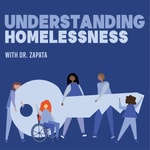Understanding Homelessness Podcast – Détails, épisodes et analyse
Détails du podcast
Informations techniques et générales issues du flux RSS du podcast.

Understanding Homelessness Podcast
Homlessness Research & Action Collaborative
Fréquence : 1 épisode/25j. Total Éps: 16

Classements récents
Dernières positions dans les classements Apple Podcasts et Spotify.
Apple Podcasts
🇨🇦 Canada - nonProfit
04/08/2025#71🇺🇸 États-Unis - nonProfit
04/08/2025#88🇨🇦 Canada - nonProfit
03/08/2025#59🇨🇦 Canada - nonProfit
02/08/2025#56🇨🇦 Canada - nonProfit
01/08/2025#48🇨🇦 Canada - nonProfit
31/07/2025#45🇨🇦 Canada - nonProfit
30/07/2025#37🇨🇦 Canada - nonProfit
29/07/2025#30🇨🇦 Canada - nonProfit
28/07/2025#18🇺🇸 États-Unis - nonProfit
20/06/2025#80
Spotify
Aucun classement récent disponible
Liens partagés entre épisodes et podcasts
Liens présents dans les descriptions d'épisodes et autres podcasts les utilisant également.
See allQualité et score du flux RSS
Évaluation technique de la qualité et de la structure du flux RSS.
See allScore global : 37%
Historique des publications
Répartition mensuelle des publications d'épisodes au fil des années.
Seeking Research Justice
Épisode 15
jeudi 4 août 2022 • Durée 58:41
Dr. Andres Lopez, research director for the Coalition of Communities of Color (CCC), and Dr. Mira Mohsini, CCC’s senior researcher, talk about community based participatory action research and research justice. Their work recognizes and uplifts the expertise that exists within the community, and the ability of those most impacted to offer insight into solutions that work best.
Episode 14: Villages as Alternative Shelter
Épisode 14
mardi 19 juillet 2022 • Durée 56:48
Todd Ferry from Portland State University shares the results of his study on villages as alternative shelter and the how-to guide developed from the research. A key finding in the Village Research and How-To Guide was that 69% of villagers said that they should share in decision making at the village, and it was a key contributor to villager satisfaction. Homelessness Research & Action Collaborative researchers Dr. Marisa Zapata and Dr. Greg Townley were also part of the research team. Ferry also talks about how he got into this work and a little bit about the history of villages in Portland.
Update to Episodes 4 and 5
Saison 1 · Épisode 5
jeudi 14 octobre 2021 • Durée 01:25
Hey podcast listeners. This is Stefanie Knowlton, editor of the Understanding Homelessness podcast, with an update from last week’s two-part episode. The conversation with Don’t Evict PDX was recorded in early summer, and there have been some additional tenant supports that have come online since then. Oregon Law Center launched the Eviction Defense Project, which now offers legal support to all low-income tenants in Oregon facing a court eviction. Support includes a legal review of your case, legal advice, and in many cases some level of representation. It should only take one to two days to hear back from OLC. You can reach them at (888)-585-9638 or evictiondefense@oregonlawcenter.org. Please share this information with anyone who needs it. Despite these supports, Oregon still does not have a legal right to counsel in eviction cases. This is something that Don’t Evict PDX is prioritizing for the future. Thank you for listening.
Episode 5: Violence is not a metaphor
Épisode 5
jeudi 7 octobre 2021 • Durée 23:00
UPDATE: Since recording this episode, Oregon has expanded legal support to all low-income tenants facing a court eviction. For more information, contact the Oregon Law Center at (888)-585-9638 or evictiondefense@oregonlawcenter.org
This is part two of our conversation with Don’t Evict PDX where we talk about the violence of eviction, systemic issues, biggest fears for the future, and what is next for the organization. Don’t Evict PDX is an all volunteer tenants’ organization that mobilized during the pandemic to observe eviction court and organize around what they saw. The end of the show also includes resources for those battling eviction.
Episode 4: Eviction Court
Épisode 4
jeudi 7 octobre 2021 • Durée 30:51
UPDATE: Since recording this episode, Oregon has expanded legal support to all low-income tenants facing a court eviction. For more information, contact the Oregon Law Center at (888)-585-9638 or evictiondefense@oregonlawcenter.org
Don’t Evict PDX is an all volunteer tenants’ organization that mobilized during the pandemic to observe eviction court and organize around what they saw. While some additional supports have since become available, listen for those at the end of the episode, their efforts still underscore housing injustices in the Portland Metro Area. Eviction is a key contributor to homelessness. This is part one of our conversation with Don’t Evict PDX. Listen to the next half in episode 5.
Episode 3: Affordable housing is key
Épisode 3
mercredi 28 juillet 2021 • Durée 24:16
The executive director of Home Forward, Michael Buonocore, talks about the history of affordable housing, why there isn’t enough to meet the need, and barriers to making it happen faster. The conversation also includes what a housing wage looks like and a few thoughts on NIMBYs.
Episode 2: AfroVillage Movement takes shape
Épisode 2
mercredi 28 juillet 2021 • Durée 32:52
Community health worker, activist and grassroots organizer LaQuida Landford talks about her roots in Belize and her lived experience of homelessness, and how both shape her vision for the AfroVillage Movement. She has worked for several Portland area nonprofits working on homelessness including Central City Concern, JOIN, and Urban League of Portland. Now she is creating her own movement. The AfroVillage will be a healing space for communities of color.
Episode 1: Beyond the headlines and soundbites
Épisode 1
lundi 19 juillet 2021 • Durée 06:31
Let’s clear away some of the rhetoric about homelessness and identify the key questions that frame this discussion. Dr. Marisa Zapata, director of PSU’s Homelessness Research & Action Collaborative, talks about the question she hears most often and how the answer is more nuanced than you might think. In future episodes, she will talk with experts, including those with lived experience, to understand what homelessness means for communities of color in particular, and what we can do to move forward to address it.
Episode 13: Invisible Homelessness Counts
Épisode 13
mardi 7 juin 2022 • Durée 52:59
People living doubled up with friends or family due to economic hardship, sometimes called invisible homelessness, is not always clear to communities or even those experiencing it due to stigma and lack of resources. The Chicago Coalition for the Homeless teamed up with advocates and researchers to develop a unique way to count people living doubled up using U.S. Census microdata. In this episode, we talk with researcher Molly Richard, a student at Vanderbilt University, Samuel Carlson, manager of Research and Outreach at Chicago Coalition for the Homeless, and Edrika Fulford, a community organizer with lived experience of doubled-up homelessness.
We dedicate this episode to Edrika who died shortly after this recording. Those who knew her said that Edrika brought immense passion and resolve to all that she did as a leader and advocate, whether speaking at rallies, testifying at press conferences, officiating events, or providing interviews with the media. She will be deeply missed and forever part of the Chicago Coalition for the Homeless’s mission and legacy.
Episode 12: Racial inequity in permanent supportive housing
Épisode 12
vendredi 13 mai 2022 • Durée 45:21
Dr. Norweeta Milburn and Earl Edwards from UCLA share their recent study with co-authored with California Policy Lab colleagues Dean Obermark and Janey Roundtree: Inequity in the Permanent Supportive Housing System in Los Angeles: Scale, Scope and Reasons for Black Residents’ Return to Homelessness. A key finding shows that Black residents were 19% more likely than White residents to return to homelessness from permanent supportive housing in Los Angeles County. The higher rates of homelessness and inequitable outcomes mirror trends across the country. The researchers talk about the reasons behind the results, which are also outlined in their report.
